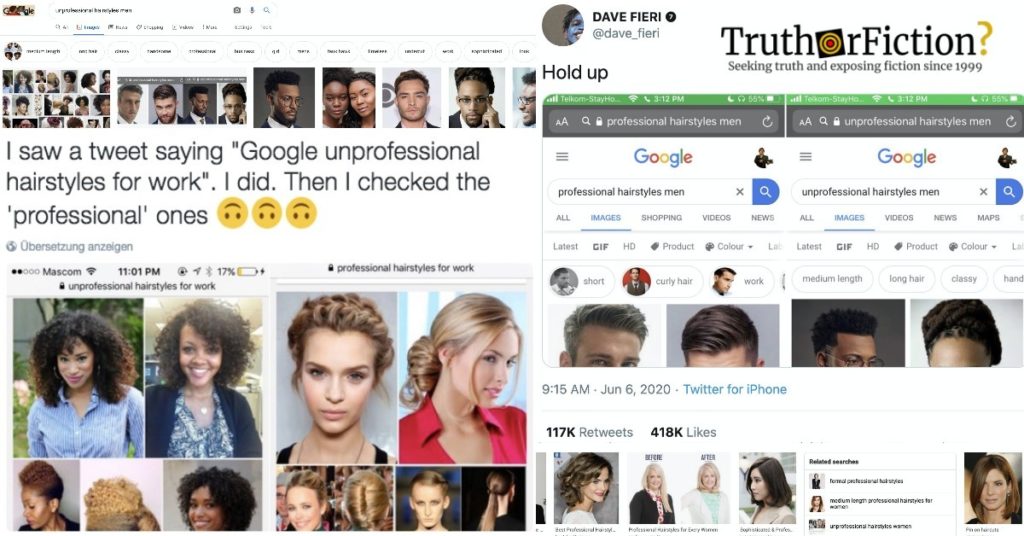On June 9 2020, Facebook user Xavier Dillingham shared the following Twitter screenshots, which purportedly showed Google search results for the terms “professional hairstyles men,” “unprofessional hairstyles men,” “professional hairstyles women,” and “unprofessional hairstyles women”:
Dillingham included screenshots of tweets by @Denzel_Success and @dave_fieri with a visible date on one of June 6 2020:
One of the screenshots visible in the Facebook post appeared to show at least one result specifically about the matter of Google’s purported racial bias in organizing images of men’s and women’s “professional hairstyles” and “unprofessional hairstyles.”
When we searched “professional hairstyles men” on June 19 2020, the results were primarily of white men:

As was a search for “professional hairstyles women”:

When we searched “unprofessional hairstyles men” and “unprofessional hairstyles women,” the results appeared to have been altered by discourse on social media. For the second search, a number of collages appeared, along with links to content about bias in Google results:


We also found discussions about the matter going back for years. On April 6 2016, Mic.com covered the same issue in an article titled “If You Google ‘Unprofessional Hairstyles for Work,’ These Are the Problematic Results,” reporting that April 2016 results included versions of the same hairstyle for both searches:
The people in a search for professional hairstyles are predominantly white. Conversely, people in searches for unprofessional are mostly black — though for some reason, Elizabeth Banks as The Hunger Games’ Effie Trinket makes a surprise appearance.
Twitter user MalumDube pointed out the irony of a similar style worn by Rachel McAdams was somehow deemed “unprofessional” when worn by a black woman.
British outlet The Guardian published an editorial about the April 2016 controversy, in which the author described clicking through some of the images and explained their occasional context:
In the case of the great hair debate, Google Images seems to have taken many of the pictures of black women wearing the “unprofessional” hairstyles were from blogs, articles and Pinterest boards. Many of these are by people of colour explicitly discussing and protesting against racist attitudes to hair. One image led me to a post criticising Hampton University’s ban on dreadlocks and cornrows; another was linked with a post celebrating natural hair and the “ridiculous” pressure to straighten it for the office; here’s a rejection of the idea that big, natural curls are “distracting” in a newsroom.
One thing was clear between the 2016 popularity of a Google image search for “unprofessional hair men/women” and “professional hair men/women” — viral discourse in both instances appeared to influence the images returned by Google in both cases. Collages we found in the results on June 19 2020 often accompanied reporting on the Google results, pushing down what may have been earlier, accurately described results before tens of thousands of Google users tested the hypothesis.
On June 10 2020, The Shade Room published a statement from Cathy Edwards, Vice President of Google Images, about the discussion. Edwards reiterated the claim that articles decrying descriptions of black women’s natural hair as “unprofessional” made up some but not all of the images:
Google spoke exclusively to us to explain these image results, which are usually linked to articles that are actually denouncing the biases that black men and women face when it comes to their hair and society’s idea of what professional hair is supposed to look like.
“Our Google Images search systems rely on a number of factors, including word matching, to surface results,” Cathy Edwards, VP of Google Images, tells us. “For many of the results, the words ‘unprofessional hairstyles’ appear in the articles, and many of these stories are rightly denouncing the discrimination people of color face when it comes to their hair.”
While the images may be alarming, for the purposes of clarity, Google has taken the liberty of adding captions to help people under the relevancy of the images.
“While we include captions to help people understand why these images are relevant to the query, we acknowledge that the association can be concerning and painful to see without the fuller context,” Edwards said. “Ensuring that all people and communities are able to find helpful results in Google Images is something we care about deeply and are actively working to improve.”
Rating the veracity of the claim that Google search results for the terms “professional hairstyles men,” “unprofessional hairstyles men,” “professional hairstyles women,” and “unprofessional hairstyles women” demonstrated racial bias was difficult due in part to how viral the claim became. Facebook posts and tweets with tens of thousands of shares reshuffled the results, and Google could have changed their algorithms in the two-week period between the June 6 2020 tweets and our June 19 2020 fact check. It is true that some of the results remained (and were the subject of scrutiny in 2016), but the results we evaluated were influenced by the interest generated by the claims — and other forces that remained invisible.
- "professional hairstyles men"
- "unprofessional hairstyles women"
- If You Google "Unprofessional Hairstyles for Work," These Are the Problematic Results
- Do Google's 'unprofessional hair' results show it is racist?
- Google Explains Why A Search For ‘Unprofessional Hairstyles’ Shows Mostly Black People (Exclusive)

